topic1
Topic 1 Confucius 孔子

In educational practice, he created flexible teaching methods, promoting the combination of learning and thinking, learning and reviewing as well as teaching and learning. He emphasized on individualized and heuristic [hjuˈrɪstɪ k]启发式的teaching . These ideas are still of great significance in practice today.
相传他有弟子三千,其中七十二贤人。孔子去世后,其弟子 及其再传弟子把孔子及其弟子的言行语录和思想记录下来, 整理编成儒家经典《论语》。
As one of the greatest thinker, educator, philosopher and the founder of the Confucian school and Confucianism in the history of China, Confucius’ legacy [ˈleɡəsi]遗产 lies in the following three aspects:
700多年前,马可·波罗开辟了中意交往的先河,此后的利玛窦、郎世宁进一步拉近了 中意两国人民的距离。
A Brief Introduction
A Brief Introduction
Confucius (551 B.C—479 B.C.) is one of the most famous Chinese people. As the founder of Confucianism, his thought has exerted a deep influence
Topic 1经典考题综合演练
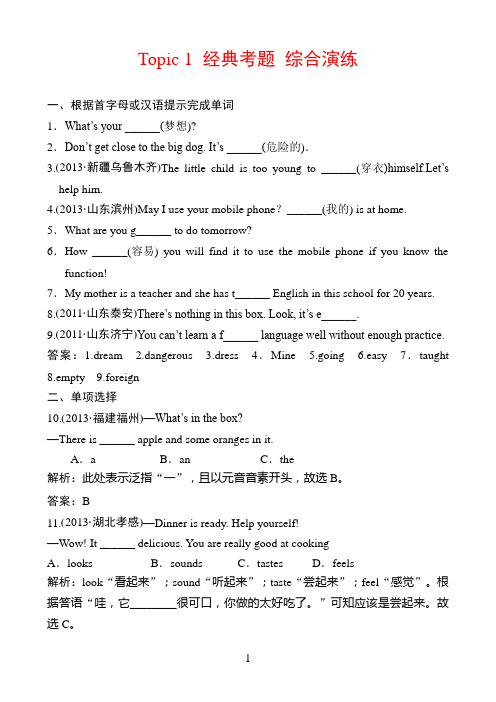
Topic 1 经典考题综合演练一、根据首字母或汉语提示完成单词1.What’s your ______(梦想)?2.Don’t get close to the big dog. It’s ______(危险的).3.(2013·新疆乌鲁木齐)The little child is too young to ______(穿衣)himself.Let’s help him.4.(2013·山东滨州)May I use your mobile phone?______(我的) is at home. 5.What are you g______ to do tomorrow?6.How ______(容易) you will find it to use the mobile phone if you know the function!7.My mother is a teacher and she has t______ English in this school for 20 years.8.(2011·山东泰安)There’s nothing in this box. Look, it’s e______.9.(2011·山东济宁)You can’t learn a f______ language well without enough practice. 答案:1.dream 2.dangerous 3.dress 4.Mine 5.going 6.easy 7.taught8.empty9.foreign二、单项选择10.(2013·福建福州)—What’s in the box?—There is ______ apple and some oranges in it.A.a B.an C.the解析:此处表示泛指“一”,且以元音音素开头,故选B。
Unit 1 Topic 1 Section A-九年级英语上册(仁爱版)
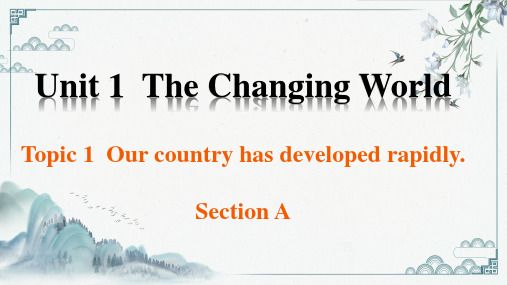
2b Work in groups and find out the differences between have/has been to and have/has gone to.
sb. have/has been to … 某人去过……(去而复返)
Find the sentences with Present Perfect Tense in Section A. Read them aloud.
You have just come back from your hometown. Great changes have taken place there and my hometown has become more and more beautiful. I have been to Mount Huang with my parents. Oh, she has gone to the library.
现在完成时: have/has + 过去分词
1b Listen to 1a and complete the table.
many _p_l_a_ce_s__ her _h_o_m_e_t_o_w_n__ has
Rita
near the home in become more and more
_I_n_d_ia__
在
have been to 曾去过某地(已回) have been in 仍在某地
完 ②短暂性动词(瞬间动词)可以用于现在完成时,
成
但不能与表示延续性的词for..., since...连用,以及 不能用于how long提问的疑问句中。
时 ③It is+时间段+ since+一般过去时的句子
最新仁爱英语八年级上Unit 1 topic 1重要短语及句型梳理

Unit 1 Topic1I’m going to play basketball.温故知新--梳理知识方块重点单词一、根据提示填写单词或词组,每空一词。
1.Our ________(足球) /ti:m/ is having a match a No. 11 Middle School.【答案】1.football, team, against2.skating, tennis 3 during 4. join5. cheer, on6. will win7.prefers, to二、选择括号内恰当的单词填入空白处,使句子完整,正确。
【答案】1. jumping2. hearts3. having4. healthy5. relax6.for三.词汇拓展【答案】词组Section A1.be going to do sth. 打算做某事2. see sb. do sth. 看见某人做某事see sb. doing sth. 看见某人正在做某事3.during the summer holidays 在暑假期间4.have a basketball game against … 举行一场对……的篮球赛5. Me, too. 我也一样。
6. cheer sb. on 为某人加油助威1.win → _______________(n.)→ ______________(过去式/过去分词) 2.football → _______________ (同义词)3.skate → _______________ (现在分词)4.science → _______________ (名词)科学家5.music → ______________ (名词)音乐家6.policeman → ____________ ( pl.)男警察7.postman → ___________ (pl.)邮递员 8.fisherman →____________ (pl.)渔民9.spend →___________ (过去式/过去分词) 10.healthy →__________ (n.)健康→ (同义词)____________ 健康的11.relax → ____________ (adj.)_放松的→ ____________ (adj.)_令人放松的 12.famous → ____________(名词)13.leave →__________(过去式/过去分词)1.win → ____winner__________(n.)→ _____won_________(过去式/过去分词) 2.football → ____soccer___________ (同义词)3.skate → ____skating___________ (现在分词)4.science → ___scientist____________ (名词)科学家5.music → __musician ____________ (名词)音乐家6.policeman → ___policemen_________ ( pl.)男警察7.postman → ___postmen________ (pl.)邮递员 8.fisherman →__fishermen __________ (pl.)渔民9.spend →__spent_________ (过去式/过去分词) 10.healthy →___health_______ (n.)健康→ (同义词)__fit __________ 健康的12.relax → ___relaxed_________ (adj.)_放松的→ ____relaxing________ (adj.)_令人放松的 12.famous → ____fame________(名词) 13.leave →__left________(过去式/过去分词)7.talk about 谈论8.prefer doing sth. 更愿做某事9.quite a lot 相当多l0.join the school rowing team 加人学校划船队11.go swimming/rowing/cycling/skating 去游泳/划船/骑自行车/滑冰12. table tennis 乒乓球Section B1.one's favorite sport某人最喜欢的运动2.of course 当然3. Me , too. 我也是。
湘教版-英语-九上-Topic 1 .(重点单词词组句子归纳)
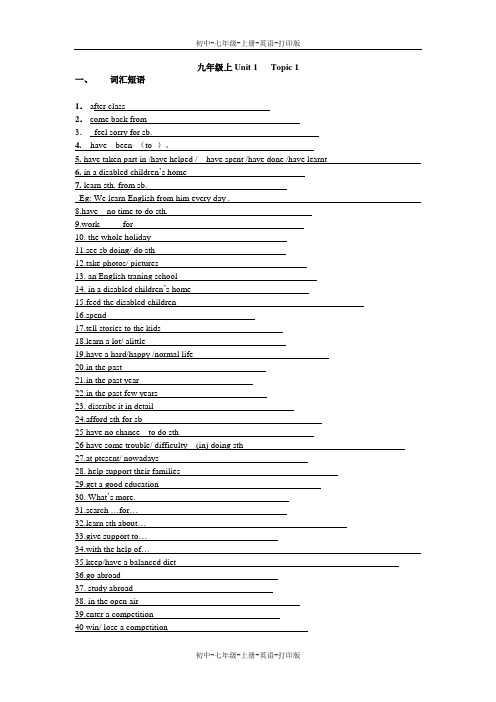
九年级上Unit 1 Topic 1一、词汇短语1.after class2.come back from3.feel sorry for sb.4.have been (to )。
5. have taken part in /have helped / have spent /have done /have learnt6. in a disabled children’s home7. learn sth. from sb.Eg: We learn English from him every day .8.have no time to do sth.9.work -----for---10. the whole holiday11.see sb doing/ do sth12.take photos/ pictures13. an English traning school14. in a disabled children’s home15.feed the disabled children16.spend17.tell stories to the kids18.learn a lot/ alittle19.have a hard/happy /normal life20.in the past21.in the past year22.in the past few years23. discribe it in detail24.afford sth for sb25 have no chance to do sth26 have some trouble/ difficulty (in) doing sth27.at ptesent/ nowadays28. help support their families29.get a good education30. What’s more.31.search …for…32.learn sth about…33.give support to…34.with the help of…35.keep/have a balanced diet36.go abroad37. study abroad38. in the open air39.enter a competition40 win/ lose a competition41.write a lettered to do sth43 get/be used to doing sth44. be used to do sth45.one…., the other…46. some……, others…47.on the other hand48 on the other side of..49. at sunrise50. fall ill51 send …to…52. elder brother53 .be cruel for sb54.at that time/ moment55. feel/ be satisfied with…56. happen/ take place57 What happened to sb?58.dream of/ about…59.in the future6.in recent years61. in the past62.ring roads63.living conditions64.thanks to..65 .stand for…66.prepare for/ get ready for..67. welcome to….68. consider doing sth69. manage to do sth.70.Is that so ?71. consider …as…72. plant crops73. draw up…74.have gone to75. have been to..76. have been in….(for…)1.One World, One Dream 2.Thanks to the government’s efforts 3.the capital of---4.. the rich culture of china5.as well6.with the help of =with one’s help.7.divide my money into two parts.8. at that time/on that day9. --enough--- to do sth.10.made such rapid progress11. write an article about12.the Chinese teenagers’ lives二、重点句子1.Did you have a good summer holiday?2.How was your trip?3.In one place I saw children working for a cruel boss.4.I felt sorry for them.5.A: Where have you been, Jane?B: I have been to Mount Huang with my parents.6.A: Where has he/she / kangkang been?B: He has been to an English training school to improve his English.7.There goes the bell。
Unit1 topic 1知识点总结
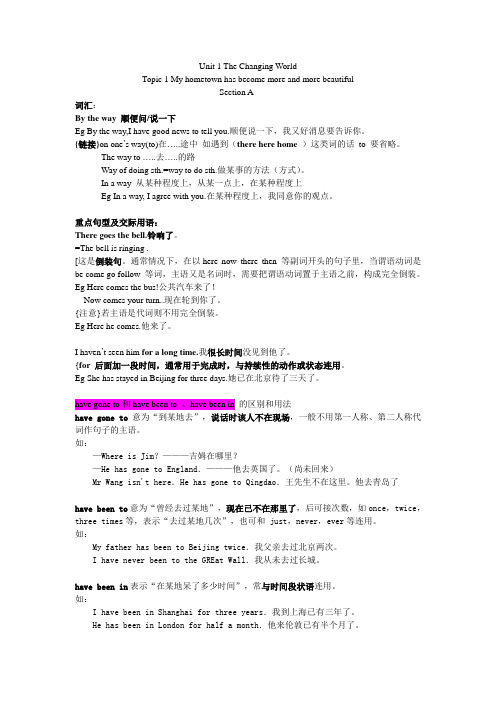
Unit 1 The Changing WorldTopic 1 My hometown has become more and more beautifulSection A词汇:By the way 顺便问/说一下Eg By the way,I have good news to tell you.顺便说一下,我又好消息要告诉你。
{链接}on one’s way(to)在…..途中如遇到(there here home )这类词的话to 要省略。
The way to …..去…..的路Way of doing sth.=way to do sth.做某事的方法(方式)。
In a way 从某种程度上,从某一点上,在某种程度上Eg In a way, I agree with you.在某种程度上,我同意你的观点。
重点句型及交际用语:There goes the bell.铃响了。
=The bell is ringing .[这是倒装句。
通常情况下,在以here now there then 等副词开头的句子里,当谓语动词是be come go follow 等词,主语又是名词时,需要把谓语动词置于主语之前,构成完全倒装。
Eg Here comes the bus!公共汽车来了!Now comes your turn..现在轮到你了。
{注意}若主语是代词则不用完全倒装。
Eg Here he comes.他来了。
I haven’t seen him for a long time.我很长时间没见到他了。
{for 后面加一段时间,通常用于完成时,与持续性的动作或状态连用。
Eg She has stayed in Beijing for three days.她已在北京待了三天了。
have gone to和have been to 、have been in 的区别和用法have gone to意为“到某地去”,说话时该人不在现场,一般不用第一人称、第二人称代词作句子的主语。
仁爱版八年级上册英语 Unit 1 Topic 1 知识点总结
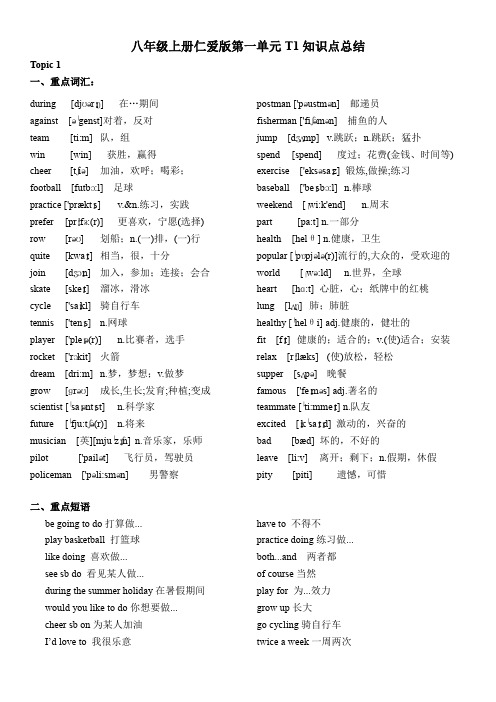
八年级上册仁爱版第一单元T1知识点总结Topic 1一、重点词汇:during [djʊərɪŋ] 在…期间against [əˈgenst]对着,反对team [ti:m]队,组win [win] 获胜,赢得cheer [tʃiə]加油,欢呼;喝彩;football [futbɔ:l] 足球practice ['præktɪs] v.&n.练习,实践prefer [prɪ'fɜ:(r)]更喜欢,宁愿(选择) row [rəʊ]划船;n.(一)排,(一)行quite [kwaɪt]相当,很,十分join [dʒɔɪn]加入,参加;连接;会合skate [skeɪt]溜冰,滑冰cycle ['saɪkl]骑自行车tennis ['tenɪs]n.网球player ['pleɪə(r)]n.比赛者,选手rocket ['rɔkit]火箭dream [dri:m]n.梦,梦想;v.做梦grow [ɡrəʊ]成长,生长;发育;种植;变成scientist [ˈsaɪəntɪst] n.科学家future [ˈfju:tʃə(r)]n.将来musician [英][mjuˈzɪʃn]n.音乐家,乐师pilot ['pailət] 飞行员,驾驶员policeman ['pəli:smən] 男警察postman ['pəustmən] 邮递员fisherman ['fiʃəmən] 捕鱼的人jump [dʒʌmp]v.跳跃;n.跳跃;猛扑spend [spend] 度过;花费(金钱、时间等) exercise ['eksəsaɪz] 锻炼,做操;练习baseball ['beɪsbɔ:l]n.棒球weekend [ˌwi:k'end]n.周末part [pa:t] n.一部分health [helθ] n.健康,卫生popular [ˈpɒpjələ(r)]流行的,大众的,受欢迎的world [ˌwə:ld]n.世界,全球heart[hɑ:t] 心脏,心;纸牌中的红桃lung [lʌŋ]肺;肺脏healthy [ˈhelθi] adj.健康的,健壮的fit [fɪt]健康的;适合的;v.(使)适合;安装relax [rɪ'læks](使)放松,轻松supper [sʌpə]晚餐famous ['feɪməs] adj.著名的teammate [ˈti:mmeɪt] n.队友excited [ɪkˈsaɪtɪd] 激动的,兴奋的bad [bæd] 坏的,不好的leave [li:v]离开;剩下;n.假期,休假pity [piti]遗憾,可惜二、重点短语be going to do打算做...play basketball 打篮球like doing 喜欢做...see sb do 看见某人做...during the summer holiday在暑假期间would you like to do你想要做... cheer sb on为某人加油I’d love to 我很乐意have to 不得不practice doing练习做... both...and 两者都of course当然play for 为...效力grow up长大go cycling骑自行车twice a week一周两次go mountain climbing去爬山spend...(in)doing花时间去做... in the gym在体育馆every day每天be good at 擅长于...school sports meet 学校运动会take part in参加the high jump跳高the long jump跳远be sure that确信the day after tomorrow后天all over the world全世界a good way to do 一个做...的好方法keep healthy/ fit保持健康arrive in 到达leave for离开...去往It’s a pity that真遗憾...join sb加入某人go skating去滑冰climb a mountain爬山row a boat划船play table tennis打乒乓球三、课文重要知识点Section A1.I’m going to play basketball.考点1):play+球类运动play football/soccer/basketball/table tennis...考点2):将来时态①will+do②be going to do 表示按计划、安排将要发生某事,有人称变化There be句型的将来时:There will be...There is/ are going to be...2.I often saw you play basketball during the summer holiday.考点1):see--sawsee sb do看见某人做...表示经常性、习惯性动作,常于时间状语often、every day等连用see sb doing 看见某人正在做...强调动作正在进行I see. 我明白了。
仁爱英语八年级上册Unit 1 Topic 1测试题
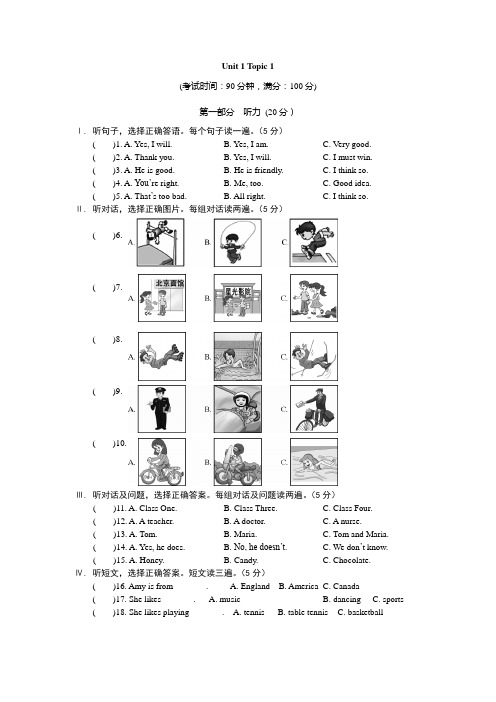
Unit 1 Topic 1(考试时间:90分钟,满分:100分)第一部分听力(20分)Ⅰ. 听句子,选择正确答语。
每个句子读一遍。
(5分)( )1. A. Yes, I will. B. Yes, I am. C. Very good.( )2. A. Thank you. B. Yes, I will. C. I must win.( )3. A. He is good. B. He is friendly. C. I think so.( )4. A. You’re right. B. Me, too. C. Good idea.( )5. A. That’s too bad. B. All right. C. I think so.Ⅱ. 听对话,选择正确图片。
每组对话读两遍。
(5分)( )6.( )7.( )8.( )9.( )10.Ⅲ. 听对话及问题,选择正确答案。
每组对话及问题读两遍。
(5分)( )11. A. Class One. B. Class Three. C. Class Four.( )12. A. A teacher. B. A doctor. C. A nurse.( )13. A. Tom. B. Maria. C. Tom and Maria.( )14. A. Yes, he does. B. No, he doesn’t. C. We don’t know.( )15. A. Honey. B. Candy. C. Chocolate.Ⅳ. 听短文,选择正确答案。
短文读三遍。
(5分)( )16. Amy is from _______. A. England B. America C. Canada( )17. She likes _______. A. music B. dancing C. sports ( )18. She likes playing _______. A. tennis B. table tennis C. basketball( )19. Which sports does Amy prefer? A. Volleyball. B. Skiing. C. Swimming.( )20. Amy thinks skiing _______. A. is good for legsB. is a good way to keep her getting up earlyC. can make her strong第二部分基础知识运用(55分)Ⅰ. 单项选择。
秋仁爱英语九年级Unit 1 Topic 1语言点

Unit 1 Topic1重点短语SectionA1、e back from从……回来2、takeplace发生3,more and more beautiful越来越美丽4, have beento曾经去过某地5。
havegoneto差不多去了某地6。
so…that…如此……以至于……7。
improve my English提高我的英语8、bytheway顺便说,顺便问一下Section B1。
takepart in参加2、disabled children残疾儿童3。
learn、。
、from…从……中学习4。
have notime totravel没有时间旅游5。
put on上演6、a group of一群7、do somethingmeaningful做一些有意义的情况SectionC1、more than…多于2、see sth、oneself亲眼所见3、in the 1960s在20世纪60年代4, have thechanceto dosth、有机会干什么5, receive a good education接受良好的教育6,keepin touchWith…与……保持联系7。
far away遥远8。
develop rapidly迅速发展9a thereform and opening up改革开放10, livingconditions生活条件11。
satisfypeople’s needs满足人们的需求12。
notonly、、,but also…不但……而且13、makerapidprogress取得迅速的进步14、succeed in doing sth、在做某事方面取得成功15、remember the past, livein the present anddreamaboutthe future记住过去,立足现在,展望未来Section D1、leisure activities休闲活动2、play an important part in sth。
仁爱八年级上册英语Topic 1 Section A教案
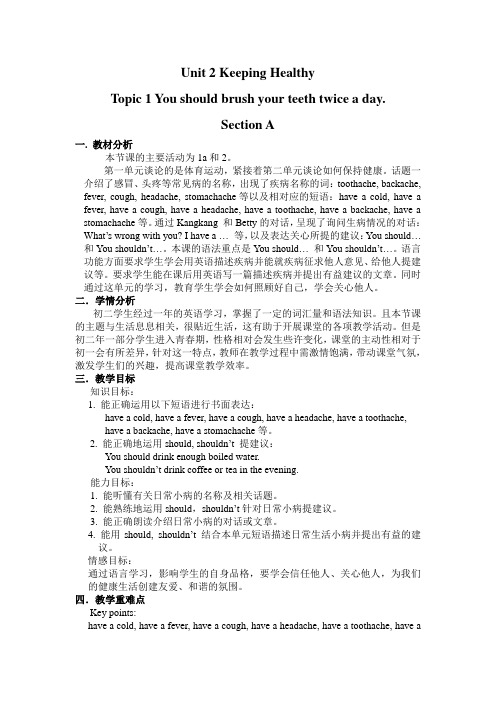
Unit 2 Keeping HealthyTopic 1 You should brush your teeth twice a day.Section A一. 教材分析本节课的主要活动为1a和2。
第一单元谈论的是体育运动,紧接着第二单元谈论如何保持健康。
话题一介绍了感冒、头疼等常见病的名称,出现了疾病名称的词:toothache, backache, fever, cough, headache, stomachache等以及相对应的短语:have a cold, have a fever, have a cough, have a headache, have a toothache, have a backache, have a stomachache等。
通过Kangkang 和Betty的对话,呈现了询问生病情况的对话:What’s wrong with you? I have a …等,以及表达关心所提的建议:You should…和You shouldn’t…。
本课的语法重点是You should…和You shouldn’t…。
语言功能方面要求学生学会用英语描述疾病并能就疾病征求他人意见、给他人提建议等。
要求学生能在课后用英语写一篇描述疾病并提出有益建议的文章。
同时通过这单元的学习,教育学生学会如何照顾好自己,学会关心他人。
二.学情分析初二学生经过一年的英语学习,掌握了一定的词汇量和语法知识。
且本节课的主题与生活息息相关,很贴近生活,这有助于开展课堂的各项教学活动。
但是初二年一部分学生进入青春期,性格相对会发生些许变化,课堂的主动性相对于初一会有所差异,针对这一特点,教师在教学过程中需激情饱满,带动课堂气氛,激发学生们的兴趣,提高课堂教学效率。
三.教学目标知识目标:1. 能正确运用以下短语进行书面表达:have a cold, have a fever, have a cough, have a headache, have a toothache,have a backache, have a stomachache等。
topic1知识点总结

topic1知识点总结IntroductionClimate change is one of the most pressing issues facing the world today. It refers to the long-term change in the Earth's climate, including changes in temperature, precipitation, and extreme weather events. The causes of climate change are complex and multifaceted, and its effects are far-reaching and potentially catastrophic. In this article, we will explore the causes and effects of climate change, as well as the potential solutions to this global crisis.Causes of Climate Change1. Greenhouse Gas Emissions: One of the primary drivers of climate change is the increased concentration of greenhouse gases in the atmosphere. These gases, including carbon dioxide, methane, and nitrous oxide, trap heat from the sun and cause the Earth's temperature to rise. The main sources of greenhouse gas emissions include the burning of fossil fuels for energy and transportation, industrial processes, and deforestation.2. Deforestation: Deforestation, particularly in tropical regions, contributes to climate change by reducing the number of trees that can absorb and store carbon dioxide from the atmosphere. In addition, deforestation releases carbon dioxide into the atmosphere when trees are cut down and burned.3. Industrial Activities: Various industrial processes, such as cement production, chemical manufacturing, and waste incineration, release greenhouse gases and other pollutants that contribute to climate change.4. Agriculture: Agricultural activities, including livestock farming and rice paddies, produce methane, a potent greenhouse gas. In addition, the use of synthetic fertilizers and the clearing of land for agriculture contribute to climate change by releasing greenhouse gases and reducing the Earth's ability to absorb carbon dioxide.Effects of Climate Change1. Rising Temperatures: Global temperatures have been steadily increasing over the past century, leading to more frequent and intense heatwaves. Rising temperatures have a wide range of effects, including melting polar ice caps, rising sea levels, and more extreme weather events.2. Extreme Weather Events: Climate change is causing more frequent and severe weather events, such as hurricanes, droughts, and heavy rainfall. These events can have devastating effects on communities, causing loss of life, destruction of infrastructure, and displacement of populations.3. Melting Glaciers and Ice Caps: The warming climate is causing glaciers and ice caps to melt at an accelerated rate. This contributes to rising sea levels and can have a significant impact on coastal communities and ecosystems.4. Ocean Acidification: The absorption of carbon dioxide by the world's oceans is causing them to become more acidic, which has negative effects on marine life, including coral reefs and shellfish.5. Ecological Disruption: Climate change is causing shifts in the distribution and behavior of plant and animal species, leading to ecological disruption and loss of biodiversity. Solutions to Climate Change1. Renewable Energy: Transitioning to renewable energy sources, such as solar, wind, and hydroelectric power, can help reduce greenhouse gas emissions and combat climate change.2. Energy Efficiency: Improving energy efficiency in buildings, transportation, and industrial processes can reduce energy consumption and greenhouse gas emissions.3. Reforestation: Planting trees and preserving natural forests can help absorb carbon dioxide from the atmosphere and mitigate climate change.4. Sustainable Agriculture: Implementing sustainable agricultural practices, such as organic farming and agroforestry, can reduce greenhouse gas emissions from the agriculture sector.5. International Cooperation: Addressing climate change requires global cooperation and coordination, as the effects of climate change are not confined to national borders. ConclusionClimate change is a complex and urgent issue that requires decisive action at the local, national, and global levels. By understanding the causes and effects of climate change, and implementing solutions to mitigate its impact, we can work towards a more sustainable and resilient future for the planet. It is crucial that we take action now to address this global crisis and protect the Earth for future generations.。
topic 1 重点知识点总结及练习

Unit 1 Playing SportsTopic 1 I’m going to play basketball.一.重要句型:Section A1. I often saw you play basketball during the summer holiday. 在暑假期间,我经常看见你打篮球。
1)A. see sb. do sth. 意为“看见某人做了某事”。
强调动作的全过程或经常反复发生,现在动作已完成;e.g. I often see Tom p lay basketball on the playground. 我经常看见汤姆在操场上打球。
B. see sb. doing sth. 意为“看见某人正在做某事”。
强调动作正在进行。
e.g. I see Tom playing basketball on the playground yesterday. 我看见汤姆在操场上打球。
2.We are going to have a basketball game against Class Three on Sunday. 周日我们班和三班要举行一场篮球比赛。
1)be going to +动词原形是将来时的一种表达法,表示主语将要进行某一行动的打算、意图,且这种打算会付诸实践。
e.g. — What are you going to do tomorrow? 明天你打算做什么?—I’m going to play soccer. 我打算踢足球。
2)against 意为“对着,反对。
”e.g. He walked against the wind. 他逆风行走。
We are against wars. 我们反对战争。
3.I hope our team will win. 我希望我们队会赢。
1)A. hope + that从句,that 可省去。
e.g. I hope that I can see you soon. 我希望我可以很快见到你。
湘教版-英语-九上-Topic 1 .(电子课文)
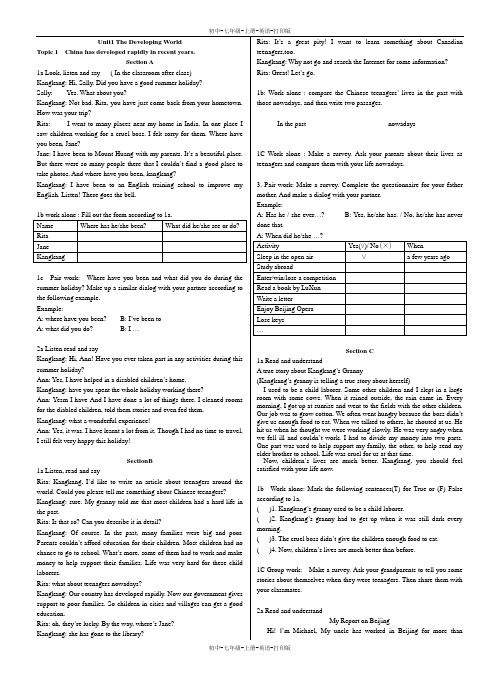
1CWork alone : Make a survey. Ask your parents about their lives as teenagers and compare them with your life nowadays.
3. Pair work: Make a plete the questionnaire for your father mother.And make a dialog with your partner.
Jane: I have been toMountHuangwith my parents. It’s a beautiful place.But there were so many people there that I couldn’t find a good place to take photos.And where have you been, kangkang?
Kangkang: sure. My granny told me that most children had a hard life in the past.
Rita: Is that so?Can you describe it in detail?
Kangkang: Of course. In the past, many families were big and poor.Parents couldn’t affordeducation for their children. Most children had no chance to go to school.What’s more, some of them had to work and make money to help support their families. Life was very hard for these child laborers.
仁爱版九年级上册英语Unit-1-Topic-1-知识点总结

仁爱版九年级上册英语U n i t-1-T o p i c-1-知识点总结(总8页)--本页仅作为文档封面,使用时请直接删除即可----内页可以根据需求调整合适字体及大小--Unit 1 Topic 1※ 短语集锦a good summer holiday 暑假过得好place 发生3. have / has been to 去过某地 (去而已归)have / has gone to 去了某地(去而未归)4. so many / few + 可数名词复数+ that… 如此多…以至于…So much / little +不可数名词+ that…如此少的…以至于…5. a proper place to take photos / pictures一个适合拍照的地方6. by the way 顺便问一下7. There goes the bell = The bell is ringing = That’s the bell 铃声响了8. take part in = join in = be in +某项活动join + sb / club / team /组织9. tell a story to sb 给某人讲故事10. feed the disabled children 喂残疾儿童11. What a wonder experience! 多么精彩的一次经历啊!12. learn a lot from … 从…中学习到很多13. have no time to do sth 没有时间做某事14. chat on line 上网聊天15. around the world = all over the world 全世界16. have a hard life = live a hard life 过着艰苦的生活Life is hard for sb 对某人来说生活是艰难的17. in detail 详细地18. in the past 在过去at present 现在in the future 将来19. Is that so = Really 真的吗真是那样吗20. in order to = so that = in order that 为的是;以便于in order to 后+动词短语so that / in order that后+ 句子21. support a family 供养一个家庭give support to 给…提供帮助22. day and night 日日夜夜23. What about you = How about you 你呢24. Now our country has developed rapidly.现在我们国家发展迅速developed:发达的developing:发展中的development:发展eg:1)China is a developing country.2) Japan is the only developed country in Asia.3) With the development of China, people’s living conditionsbecome better and better.25. get / have / receive a good education 接受良好的教育26. have a balanced diet 均衡膳食27. more than = over 超过; 多余28. see … oneself 亲自看到29. in the 1968s 在二十世纪六十年代30. the living conditions 生活条件31. have a chance to do 有机会做某事32. keep in touch with 与某人保持联系get in touch with 与某人取得联系33. by letter or telegram 靠信件或电报34. things to choose from 供挑选的东西35. sorts of = kinds of 多种36. not only … but also … 不但….而且…37. What’s more 而且38. make progress 取得进步make rapid progress 取得快速的进步make great progress 取得巨大的进步39. succeed in doing sth = be successfulin doing sth 成功做某事eg: Beijing succeeded in hosting the 29thOlympic Games in 2008. (同义句)= Beijing was successful in hosting the 29thOlympic Games.40. It’s important for sb to do sth 做…对某人是重要的41. dream about / of doing sth 梦想做某事42. watch a movie in the open air 看露天电影43. with the help of = with one’s help 在某人的帮助下44. draw up 拟定;起草45. t hanks to … = because of 多亏;由于over = look over 检查※精讲精析Section A1.have / has been to 去过某地(去而已归)与ever, never, before及次数等连用have / has gone to 去了某地(去而未归)have / has been in 表示在…已经多久了eg:用been, gone, in填空1)_ Where have you_ I have to a shopping center.2)_ Where is Maria_ She has to Cuba.3)_ Has your mother ever there?4)5)_ No, she has never there.6)She has to England. She will come back in ten days.7)He has to Xian many times.8)He has been China for two years.9)How long have you been in this city?10)11)2. so ... that ... / such ... that ...都可意为如此...以至于...区别如下:1)so +形容词 + a / an + 单数名词= such + a / an + 形容词 + 单数名词eg:1) It is so moving a movie that all of us can’t help crying.(同义句)= It is such a moving movie that all of us can't help crying.2) It is so interesting a book that I read it again and again. (同义句)2) 如果名词是可数名词复数或不可数名词时这时只能用such , 不能用so3) 如果名词前有many , much , little, few时只能用so,不能用such.练习:用so / such 填空1) The boy is young that he can’t go to school.2) She told us a funny story that we all laughed.3) He has few books to read that he has to borrow some from the school library.4) It is a tall building that I can’t see its top.5) The old man is ill that he can’t get up.6) It was fine weather that we went swimming last weekend.7) They are small children that they can’t go to school.8) She speaks English well that the teacher praises(表扬)her.9) There is little bread that it is not enough for many people.10) It is delicious food that we all like it very much.3. There goes the bell.(同义句)= The bell is ringing.= That’s the bell.4.I want to work hard to make my English better.(同义句)= I want to work hard to improve myEnglish.注意:so ... that 句型的否定可与too ... to 句型和not enough ... to do 句型进行转换eg:1) Tom is so young that ha can’t go to school. (同义句)= Tom is too young to go to school.= Tom isn’t old enough to go to school.2)The desk is so heavy that I can’t move it. (同义句)= The desk is too heavy for me to move.= The desk isn’t light enough for me to move.3)The apple tree is so tall that we can’t reach it.(同义句)= The apple tree is too tall for us to reach.= The apple tree isn’t short en ough for us to reach.5.1) I have been to Beijing.(提问)Where have you been?2) Lily has been to Cuba.(提问)Where has lily been?3) My sister has gone to the gym.(提问)Where has your sister gone?4) They have gone to Shanghai.(提问)Where have they goneSection B1.in a disabled children’s home在残疾儿童之家2.experience 在此处意为经历What a wonderful experience!一次多么棒的经历啊!experience还可意为经验讲,作经验讲时它是一个不可数名词eg: The teacher has a lot of teaching experience.这个老师有许多教学经验。
仁爱版英语九年级复习课件:九年级 Unit 1 Topic 1

1./bel/
bell
2./æfrɪkə/
Africa
3./ʃʌt/
shut
4./evə(r)/
ever
5./rəʊp/
rope
6./kə mjuːnɪkeɪʃn/ communication
7./rɪpɔː(r)t/ 8./relətɪv/ 9./sɪns/ 10./sætɪsfaɪ/ 11./medɪkl/ 12./məʃiːn/ 13./ræpɪd/ 14./prəʊɡres/ 15./ɔːlredi/ 16./haɪd/ 17./tʃes/
6. A lot of people love both to play and to watch team sports like basketball or football.
2. There goes the bell.= That’s the bell. = The bell is ringing.
意思是“上课铃响了。” 此句是倒装语序。以here或者there开头时,主语 是名词时完全倒装;但主语是代词时一般不用倒装。 e. g. ⑴__T_h_e_re__c_o_m_e_s_t_h_e_b_u_s_. “公共汽车来了。”
the changes in .
7.我i认n 为记住过去、立足现在、展望未来非常重要。
I think it is important toremember the past ,
Unit 1 Topic 1 ---3 重难点知识归纳总结2021-2022学年仁爱版英语八年级上册
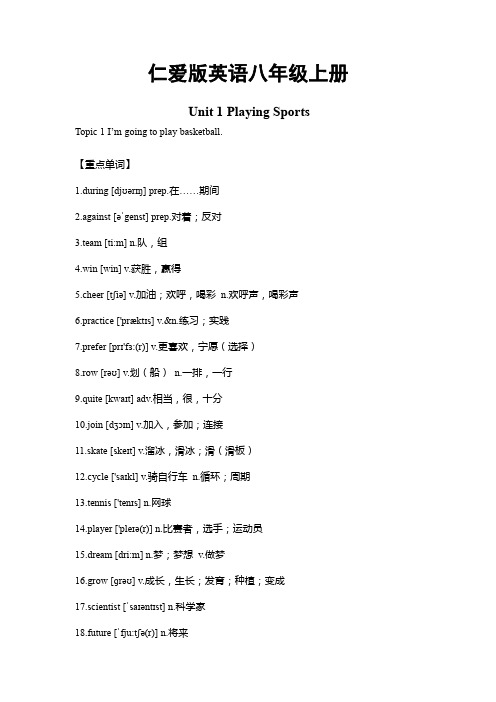
仁爱版英语八年级上册Unit 1 Playing SportsTopic 1 I’m going to play basketball.【重点单词】1.during [djʊərɪŋ] prep.在……期间2.against [əˈgenst] prep.对着;反对3.team [ti:m] n.队,组4.win [win] v.获胜,赢得5.cheer [tʃiə] v.加油;欢呼,喝彩n.欢呼声,喝彩声6.practice ['præktɪs] v.&n.练习;实践7.prefer [prɪ'fɜ:(r)] v.更喜欢,宁愿(选择)8.row [rəʊ] v.划(船)n.一排,一行9.quite [kwaɪt] adv.相当,很,十分10.join [dʒɔɪn] v.加入,参加;连接11.skate [skeɪt] v.溜冰,滑冰;滑(滑板)12.cycle ['saɪkl] v.骑自行车n.循环;周期13.tennis ['tenɪs] n.网球14.player ['pleɪə(r)] n.比赛者,选手;运动员15.dream [dri:m] n.梦;梦想v.做梦16.grow [ɡrəʊ] v.成长,生长;发育;种植;变成17.scientist [ˈsaɪəntɪst] n.科学家18.future [ˈfju:tʃə(r)] n.将来19.musician [mjuˈzɪʃn] n.乐手,音乐家,乐师20.pilot ['pailət] n.飞行员;驾驶员21.policeman ['pəli:smən] n.(pl.-men)男警察22.policewoman [pəˈliːswʊmən] n.(pl.-women)女警察23.postman ['pəustmən] n.(pl.-men)邮递员,邮差24.fisherman ['fiʃəmən] n.(pl.-men)渔民;钓鱼的人25.jump [dʒʌmp] v.&n.跳跃26.spend [spend] v.花费( 金钱、时间等) ;度过27.exercise ['eksəsaɪz] v.锻炼n.锻炼;练习28.baseball ['beɪsbɔ:l] n.棒球29.weekend [ˌwi:k'end] n.周末30.part [pa:t] n.部分;一些;片段31.health [helθ] n.健康;保健32.popular [ˈpɒpjələ(r)] adj.流行的,大众的,受欢迎的33.world [ˌwə:ld] n.世界;地球34.heart [hɑ:t] n.心脏,心35.lung [lʌŋ] n.肺;肺脏36.healthy [ˈhelθi adj.健康的,健壮的37.fit [fɪt] adj.健康的;适合的v.(使)适合;安装38.supper [sʌpə] n.晚饭,晚餐39.relax [rɪ'læks] v.(使)放松,轻松40.famous ['feɪməs] adj.著名的41.teammate [ˈti:mmeɪt] n.队友42.excited [ɪkˈsaɪtɪd] adj.激动的,兴奋的43.bad [bæd] adj.坏的;令人不愉快的44.leave [li:v] v.离开;把……留下,剩下n. 假期,休假45.pity [piti] n.遗憾,可惜;同情,怜悯【重点短语】1.cheer... on 为……加油2.grow up 长大成人,成人3.in the future 在将来4.be good at 擅长于5.take part in 参加,加入6.be good for 对……有益7.all over 到处,遍及8.the day after tomorrow 后天9.keep fit 保持健康10.leave for 动身去11.twice a week 一周两次12.all over the world 全世界13.arrive in 到达14.play against 同……比赛15.It’s a pity that... 很遗憾……【重点句型】1.—What are you doing to do? 你要去做什么呢?—I’m going to play basketball. 我要去打篮球。
topic1 话题1的英文简写

topic1 话题1的英文简写英文回答:Summary:Topic1 is a comprehensive term that encompasses a wide range of subtopics. Its scope includes the study of various aspects of human behavior, including cognition, emotion, and motivation. Research in this field aims to understand the factors that influence how people think, feel, and act.Key Areas of Research:Cognitive Psychology: Explores the mental processes involved in acquiring, storing, and retrieving information. Areas of interest include attention, memory, language, and problem-solving.Developmental Psychology: Examines how individuals change and develop throughout their lifespan, from infancyto old age. Focuses on cognitive, emotional, and social development.Social Psychology: Investigates the influence of social factors on individual behavior and attitudes. Examines topics such as conformity, obedience, and prejudice.Personality Psychology: Seeks to identify and measure the stable characteristics that distinguish individuals from one another. Traits, motives, and temperaments are commonly studied.Abnormal Psychology: Examines psychological disorders, including their causes, symptoms, and treatments. Includes areas such as anxiety, depression, and schizophrenia.Neuropsychology: Combines psychology with neuroscience to study the relationship between brain structure and function and their impact on behavior.Positive Psychology: Focuses on the strengths and virtues that contribute to well-being and happiness.Explores topics such as gratitude, resilience, and optimism.Methodologies and Tools:Research in topic1 relies on a variety of methodologies, including:Observational studies.Experimental designs.Case studies.Psychometric testing.Neuroimaging techniques.By utilizing these methods, psychologists aim tocollect data, test hypotheses, and draw conclusions about human behavior.Applications:Findings from topic1 research have practical applications in various settings, such as:Education: Designing effective teaching methods and interventions.Healthcare: Improving mental health treatments and promoting well-being.Workplace: Enhancing employee motivation and productivity.Policymaking: Informing decisions on issues related to human behavior.Conclusion:Topic1 is a dynamic and interdisciplinary field that provides valuable insights into the complexities of human behavior. Through ongoing research, psychologists continue to expand our understanding of ourselves and contribute tothe improvement of human life.中文回答:话题1概述:话题1是一个涵盖广泛子主题的综合术语。
Topic 1 人们为什么要上大学

【托福作文185篇真题范文专项练习]Topic 1:人们为什么要上大学?Topic1、People attend college or university for many different reasons (for example, new experiences, career preparation, increased knowledge). Why do you think people attend college or university? Use specific reasons and examples to support your answer.[参考提纲]1、同意上大学好.(1)为未来工作进行准备(2)交更多的朋友,学习他们的思维方式(3)系统的学习知识【参考范文之一】Why do people need to attend colleges or universities? Different people have different answers to this question. I believe that the three most common reasons are to prepare for a career, to have new experiences, and to increase their knowledge of themselves and the world around them.Career preparation is becoming more and more important to young people. For many, this is the primary reason to go to college. They know that the job market is competitive. At college, they can learn new skill for careers with a lot of opportunities. This means careers, such as information technology, that are expected to need a large workforce in the coming years.Also, students go to colleges and universities to have new experiences. This often means having the opportunity to meet people different from those in their hometowns. For most students, going to college is the first time they've been away from home bythemselves. In addition, this is the first time they've had to make decisions on their own. Making these decisions increases their knowledge of themselves.Besides looking for self-knowledge, people also attend a university or college to expand their knowledge in subjects they find interesting. For many, this will be their last chance for a long time to learn about something that doesn't relate to their career.I would recommend that people not be so focused on a career. They should go to college to have new experiences and learn about themselves and the world they live in.【参考范文之二】People study in college or university for many different reasons. I think the most important reason is to gain more knowledge and learn more skills. Of course, there are also many other reasons that people study in college such as to get more friends, and increase one's self-confidence.These days, most jobs require people who are educated and have good job skills. Therefore, the people who want a good job have to study hard and at least graduate with a high education. Furthermore, as technology advances all over the world, more and more education is required for people.Some people who study in college or university want to make more friends and increase their interpersonal skills. They enjoy their lives in university or college and tend to socialize a lot. They can meet more people who have the similar interests with themselves. They can go to uni ball after school and make more friends who they trust.The people who graduate from college seem more confident in our community. These people are more respected by society. Many people want to be respected and tobe important by family, friends, their bosses, and others in their lives. They find that most of them can confidently talk and do their jobs as they are more educated. Therefore, most people want to get the confidence through the university or college study.In today's society, people need more knowledge and skills to be adapted. The university and college study is a good way to achieve this.【参考范文之三】In China, more and more people try their best to attend college or university. What are the reasons that make people long for it?First of all, in my opinion, the most important reason is to gain competence to live a better life in the future. Competition of our days has become more and more drastic, and even a very simple job or low position will attract hundreds of candidates to apply for it. Only those who have a good education and general knowledge can gain better work. So, we should attend college or universityfor better competence.Second, attending college or university can change our life. For example, to myself, I am a student from countryside. I am one of the few people who can attend college or university. Most of those who have not studied in college or university go to work early in a small factory in a small town or on a farm in their hometown. Just because I have taken higher education, I can get better chances to study or work in the capital of our country where a lot of people want to go to. Why? Good education gives me chances to change my life.The third reason for attending a college is to increase knowledge. Study is a so interesting thing that it makes our life rich and colorful. It expands our eyesight byinforming us with lots of new things what we cannot gain from our common life or experience. On the other hand, by attending college or university, you can learn the knowledge or skill necessary for your future work.People attend college or university for various reasons. Some may attend for new experiences, and others may think about other things. What I have mentioned is just very few of them.【参考范文之四】Mr. TaoXingzhi, the most famous educator in China, once said: the biggest misfortune in one’s life is t hat one does not receive a university education. Needless to say, a university degree often helps a person achieve his goal with more ease. However, do we attend university just in pursuit of a degree? Does a university only provide us nothing beneficial besides a paper-made diploma?As far as I am concerned, we enjoy a university education in the following aspects which attributes us to a university education:Firstly, with the knowledge learned in a university, we will have a deep understanding with our society. It is true that genuine knowledge comes from practice, but it can not be denied that genuine knowledge, tells us how to practice. A thorough study in a college or university, of course, enables us to realize how the society works and how to cope with certain problems arising from it in a more efficiently, more skillful way.Second, an university education usually make it possible that we acquire a decent job. Because of an accomplishment of a four-year study, it is not difficult for us to find a good job in most cases. How can we imagine that a graduate majoring in astronomy has to be a vendor in the street! Undoubtfully, he/she should sit in his/her laboratory, making aresearch on aircraft on a computer. Obviously, a university education assures him/her a decent job.Last, but not the least, we can help others much better if putting what we learn in a university into use. A university education corrects our values, enhance our skills, and broad our horizons.With those, we are more capable of giving a hand to those who are in need of help than before. “Knowledge is power”. When achieving a degree in a university, we can get a better understanding of the society, find a decent job in an easy way, and help others better. All of those are due to the knowledge learned in a university.【参考范文之五】People attend a college or a university for the following reasons, to acquire knowledge which is necessary for a career, to contribute to the society, and to experience life.Firstly college education is a necessary step for a person who wants to start a career in science and technology areas. If a student wants to become a scientist, it is important for him to go to a science school; if he wants to be an engineer, an engineering school is the best place for him.There is no other place than a college where a student can get sophisticated education in order to be qualified to become a professional in a specific area. Secondly, a college education can benefit both the society and the student. By attending college one can get himself prepared for and contribute to the society, which seems to demand advanced knowledge more and more. On the other hand, as knowledge plays a very important role in today’s economy, it has also become the capital and asset of theperson who owns it: a college education can bring wealth not only to the society, but also benefit the individual who possesses it.In addition, college education is a wonderful experience in one’s life. Only in a college one can be taught by the finest scholars and meet with the most intelligent people in the nation. Education can also bring happiness to the student. When a student has conquered a difficult mathematical problem, he savors the joy which learning has brought to him, and feels that he is the happiest man in the world.Of course, learning in a campus does not mean as much for everybody, but it does mean a lot to me. I was brought up in a knowledge-respecting family. My farther is an engineer and my mother is a teacher in a primary school. They are both university graduates. My father, being the most influential person in my life and the son of a poor Chinese farmer, did change the destiny of his own by learning hard to earn a university degree. Therefore he firmly believes that “knowledge can change one’s destiny and university is the best place to achieve one’s goal”. Of course this influenced me. I strongly believe that attending university is the best choice for me. I do not have a bit of hesitation to attend a university.。
- 1、下载文档前请自行甄别文档内容的完整性,平台不提供额外的编辑、内容补充、找答案等附加服务。
- 2、"仅部分预览"的文档,不可在线预览部分如存在完整性等问题,可反馈申请退款(可完整预览的文档不适用该条件!)。
- 3、如文档侵犯您的权益,请联系客服反馈,我们会尽快为您处理(人工客服工作时间:9:00-18:30)。
当实验次数 n 增大时, 增大时, 逐渐趋向一个稳定值。 事件 A 的频率 fn(A) 逐渐趋向一个稳定值。 此稳定值可理解为事件 此稳定值可理解为事件 A 的概率 。 频率通常用来估计和检验概率。 频率通常用来估计和检验概率。
概率的公理化定义
一个概率空间包括( 一个概率空间包括(S, F, P)。 )。 S: 是样本空间 是样本空间; F : 是 σ-algebra; P: F [0, 1], 是一个赋予事件概率的函数。 是一个赋予事件概率的函数。
前实验 将一枚硬币连抛三次,观察正反面” 例:前实验 E2:“将一枚硬币连抛三次,观察正反面” 。 样本空间 : S = {HHH, HHT, HTH, THH, HTT, THT, TTH, TTT} 随机事件 A = “至少出现一次正面” 至少出现一次正面” 至少出现一次正面 = {HHH, HHT, HTH, THH, HTT, THT, TTH} 恰好出现一次正面” 随机事件 C =“恰好出现一次正面” 恰好出现一次正面 = {HTT, THT, TTH}
易见 A - B = A B
事件的运算
交换律: 交换律:A ∪ B = B ∪ A, AB = BA , 结合律: 结合律:(A ∪ B) ∪ C = A ∪ (B ∪ C) (AB)C = A(BC) 分配律: 分配律:(A ∪ B)C = (AC) ∪ (BC) (AB) ∪ C = (A ∪ C) (B ∪ C) DeMorgan 律:
给定一个样本空间 定义 (Kolmogorov) :给定一个样本空间 S 和所对应 对任一事件 的 σ-algebra F ,对任一事件 A ,赋予一个定义在 F 上的实值函数 上的实值函数 P(A)。 。 满足以下条件, 的概率。 若 P(A) 满足以下条件,则称 P(A) 为事件 A 的概率。 (1): 0 ≤ P(A) ≤ 1; ; (2): P(S) = 1; ; (3): 可数可加:设 A1, A2, … 是一列两两互不相容的 : 可数可加: 事件, 事件,即 AiAj = φ, (i≠j), i , j = 1, 2, …, 则 ≠ P( A1 ∪ A2 ∪ … ) = P(A1) + P(A2) + …
几何概率:事件在样本空间内所占的比例。 几何概率:事件在样本空间内所占的比例。 样本空间(例如:线段,平面, 样本空间(例如:线段,平面,等)内可以 有无穷多个样本点。 有无穷多个样本点。
排列组合
1)排列数: 从 n 个不同元素中选出 m 个, 并按一定次序排成 )排列数 一列, 则所有可能的排列数为: 一列 则所有可能的排列数为:
ABC
ABC
σ-algebra(σ-field) ( )
满足: 若样本空间的子集所组成的一个集合 F 满足: 1) 若 A ∈ F,则 Ac ∈ F 对逆是封闭的) (即, F 对逆是封闭的) 2) 若 A1, A2, … ∈ F ,则 ∪ Ai ∈ F (即, F 对可数的并是封闭的) 对可数的并是封闭的) 则称 F 为 σ-algebra 或 σ-field。 。 σ-algebra 也就是事件的集合,或事件空间。 就是事件的集合,或事件空间。 事件的集合 一个样本空间 S 可以对应许多 σ-algebra,但是, ,但是, σ-algebra 通常特指包括 S 的所有子集的最小的 那一个。 那一个。
∪ Ak
k
= ∩ Ak
k
∩ Ak = ∪ Ak
k k
两事件: 两事件: 证明:练习。 证明:练习。
A ∪B
= A∩B
AB
= A∪ B
三人各抛一枚硬币, 例:甲、乙、丙 三人各抛一枚硬币,以 A、B、C 分别表示 、 、 他们得到正面。 他们得到正面。试用 A、B、C 的运算关系表示下列事件: 、 、 的运算关系表示下列事件:
随机实验的特点: 随机实验的特点: 1). 可在相同条件下重复进行 ) 可在相同条件下重复进行; 2). 事先知道所有的可能结果(或范围); ) 事先知道所有的可能结果(或范围) 3). 一次实验之前无法确定具体哪种结果出现 ) 一次实验之前无法确定具体哪种结果出现. 随机实验: 表示. 随机实验:以字母 的可能结果所构成的集合为 样本空间, 样本空间,记为 S。 。 例:在前 E1 中,S = { H, T}。 。 例:在前 E3 中,S = { 1, 2, 3, 4, 5, 6}。 。 实验的一个结果(即样本空间的一个元素) 实验的一个结果(即样本空间的一个元素) 称为一个样本点, 称为一个样本点,记为 e。 。 样本空间可分为:可数的和不可数的。 样本空间可分为:可数的和不可数的。
是可数的, 若 S 是可数的, 则 F = {所有 S 的子集 。 所有 的子集}。 例:在前实验 E1“抛一枚硬币,观察正反面”中, 一枚硬币,观察正反面” F = { {H}, {T}, {H, T}, φ } 是不可数的, 使其包含任意感兴趣的集合。 若 S 是不可数的,可选择 F 使其包含任意感兴趣的集合。 例:若 S =(- ∞,∞) 则可选择 F 使其包含如下区间: 使其包含如下区间: , [a, b], (a, b], [a, b), (a, b)。 。 将一枚硬币连抛三次,观察正反面” 例:前实验 E2:“将一枚硬币连抛三次,观察正反面”。 前实验 S = {HHH, HHT, HTH, THH, HTT, THT, TTH, TTT} 个集合。 ∴ σ-algebra F 包含 28 个集合。
不相容(互斥):事件 不能同时发生, 不相容(互斥):事件 A 与 B 不能同时发生, ): 即,AB = φ
对立( 对立(逆, 补): A∪B = S 且 AB = φ , ∪ A 与 B 在一次实验中必定有且仅有一个发生 在一次实验中必定有且仅有一个发生. 的逆事件。 记作 B = A 或 Ac , 称为 A 的逆事件。
同时发生, 交(积):A 与 B 同时发生,记作 AB (或 A ∩ B) )
n 个事件 A1, A2, …, An 同时发生, 同时发生,记作 A1A2…An 或
i
∩ Ai =
1
n
的差事件, 差:A - B (或 A \ B ), 称为 A 与 B 的差事件, 或 不发生。 事件 A 发生而 B 不发生。
概率的性质: 概率的性质 1) 有限可加:设 A1, A2, …, An 是 n 个两两互不相容 有限可加: 的事件, 的事件,即 AiAj = φ ,(i≠j), i, j = 1, 2, …, n, 则 ≠ P( A1 ∪ A2 ∪ … ∪ An) = P(A1) + P(A2) + … + P(An) 2) 互补: P(A) = 1 - P(Ac) 互补: 3) 可分:对任意两事件 A、B,有 可分: 、 , P(A) = P(AB) + P(ABc)
4) 事件差 A,B 是两个事件,则 事件差: , 是两个事件, P(A - B) = P(A) - P(AB) 单调不减性: 5) 单调不减性:若事件 A ⊃ B, , 则 P(A) ≥ P(B) 6) 加法公式: 加法公式:对任意两事件 A、B,有 、 , P(A ∪ B) = P(A) + P(B) - P(AB) 推广到任意 推广到任意 n 个事件 A1,A2,…,An : , P( ∪ Ai) = ∑ P(Ai) - ∑ P(AiAj) + ∑ P(AiAjAk)
至少有一人得到正面: 至少有一人得到正面: 恰有一人得到正面: 恰有一人得到正面: 恰有两人得到正面: 恰有两人得到正面: 最多有一人得到正面: 最多有一人得到正面: 三人均得到正面: 三人均得到正面: 三人均未得到正面: 三人均未得到正面:
A∪ B∪ C ABC ∪ ABC ∪ ABC ABC ∪ ABC ∪ ABC BC ∪ AC ∪ AB
P
m n
= n(n - 1) … (n - m + 1) =
n! ( n - m)!
i i i<j < i<j<k <
+ … + (-1)n+1 P(A1…An)
证明:练习。 证明:练习。
等可能概型
满足: 若某实验 E 满足: 1). 有限:样本空间 S = { e1, e2, …, en } 有限: 2). 等可能:P(e1) = P(e2) = … = P(en) 等可能: 则称 E 为等可能概型(古典概型)。 等可能概型 古典概型)。 概型( 的概率为: 等可能概型中事件 A 的概率为:
事件的频率
频率(相对频率) 次重复实验中出现的 频率(相对频率): 若 nA 为事件 A 在 n 次重复实验中出现的次 频率(相对频率) 记为: 数,则称比值 nA/n 为事件 A 的频率(相对频率),记为: fn(A) = nA/n . 正面” 的概率是? 例:掷一枚匀质硬币,出现 “正面” 的概率是 0.5? 掷一枚匀质硬币, ? 实验者 DeMorgan Buffon K. Pearson K. Pearson n 2048 4040 12000 24000 nH 1061 2048 6019 12012 fn(H) 0.5181 0.5069 0.5016 0.5005
P( A) =
NA NS
中所含的样本点个数, 其中 NA 为事件 A 中所含的样本点个数, NS 为样本空间 S 中的样本点总数。 中的样本点总数。
前实验 将一枚硬币连抛三次,观察正反面” 例:前实验 E2:“将一枚硬币连抛三次,观察正反面” 至少出现一次正面( 。 求: 至少出现一次正面(事件 A)和 恰好出现一次正 ) 面 (事件 C)的概率。 )的概率。 S = {HHH, HHT, HTH, THH, HTT, THT, TTH, TTT} A = {HHH, HHT, HTH, THH, HTT, THT, TTH} C = {HTT, THT, TTH} ∴ P(A) = NA / NS = 7/8 P(C) = NC / NS = 3/8
